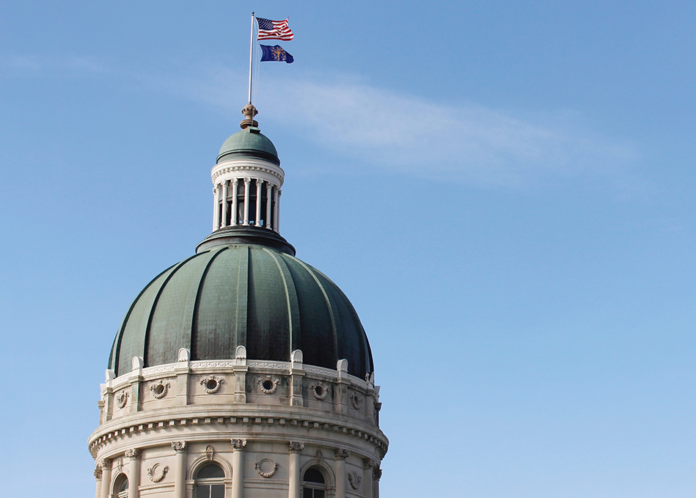Knock on wood, everyone.
As HSPA continues to read the hundreds of bills that will be filed by state senators and legislators for the 2019 General Assembly, none so far have sought to eliminate the publication of public notices.
HSPA is working with Indiana Legal Services and Indianapolis Legal Aid Society to help indigent plaintiffs publish necessary notices so that they can have access to the courts. Jon Laramore, executive director of ILS approached HSPA with its concern.
If a poor individual desired to request a legal name change for her children, she would need to give notice of the filing in a local newspaper. Since it’s a private-party public notice advertisement, it could cost hundreds of dollars depending upon which county she lives.
If the past holds up, HSPA will become involved with anywhere from 20 to 40 bills during the legislative session.
Laramore and John Floreancig, general counsel of ILAS, explained that the cost might be too steep a cost for that indigent woman, effectively blocking her from initiating the legal action. Both attorneys said the frequency of cases that fit this profile is few and far between.
HSPA offered a potential solution that both legal aid groups agreed to endorse, according to HSPA executive director and general counsel Steve Key. Under the proposal if a plaintiff has been granted indigent status by the court, he or she could file a notice that would be eligible for the same discounted rate that the legislature has provided for state and local government units.
A task force of the Indiana Supreme Court has signed off on the idea as did the executive committee of HSPA’s Board of Directors.
Rep. Greg Steuerwald, R-Danville, former chair the House Judiciary Committee, has pledged to find a home for such language in an appropriate bill during this session. A particular bill that would be ripe for such an amendment has not been identified as of Jan. 7.
Another bill that HSPA expects to see filed would concern police body cameras purchased by officers or reserve officers, not the government unit. Rep. Peggy Mayfield, R-Martinsville, reached out to HSPA to review the situation she wants to address.
She said there are law enforcement agencies that require the use of police body cameras, but don’t intend to purchase the cameras and equipment necessary to download and preserve the video taken. The cost then falls upon the officer or reserve officer to pay for the camera.
The situation raises a question as to ownership of the video taken during an officer’s shift. Does control of the video rest with the officer or the law enforcement agency? Is it a public record?
Key expressed HSPA’s concern that if the video isn’t controlled by the government unit, an officer could erase any video taken that might put the officer in a bad light or show violations of policy or criminal behavior. The integrity of all the video should be preserved for the time required currently by the state’s Access to Public Records Act, HSPA believes.
As of Jan. 7, Rep. Mayfield’s bill had not yet been released.
HSPA will again support legislation authored by Rep. Ed Clere, R-New Albany, to give high school and university journalists greater First Amendment protection against censorship by school officials. HSPA is awaiting news of this bill’s number as of Jan. 7.
Rep. Clere’s bill will be very similar to bills filed during the last two sessions. Lobbyists representing high school superintendents, principals and school boards have opposed the
legislation. University representatives have supported the idea. The Indiana High School Press Association and Indiana Collegiate Press Association have supported Clere’s efforts.
If the past holds up, HSPA will become involved with anywhere from twenty to forty bills during the legislative session




